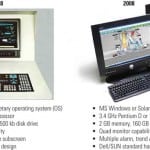The government of India has unveiled a prototype tablet computer that could revolutionize business information technology programs. The computer, said Human Resource Development Minister Kapil Sibal, is designed to sell for $35. The aim is to reduce the price to $10 through economies of mass production.
The touchscreen tablet computer, which Sibal said will see its first uses in education in India, supports web browsing, video conferencing, word processing, and other basic computer functions, and a USB port for connecting to other devices, working through the open-source Linux operating system. The device has limited internal data storage, using a memory card rather than a hard disk. Some reports, unconfirmed, say it can run on solar power.
The fundamental idea behind the Indian computer is that cloud computing will become the dominant platform for most computer applications. PCWorld’s Tony Bradley wrote, “As more companies migrate server applications and data storage to the cloud, a simple, Web-enabled platform such as this will replace the bloated desktop and laptop hardware architectures in use today.”
India’s elite Indian Institute of Technology and the Indian Institute of Science developed the prototype. According to the ministry, the private sector evidenced little interest in the project, so the government turned to academia. According to the BBC, the tablet computer is part of a national program to extend broadband access to India’s 25,000 colleges and 500 universities.
The Indian government is now starting to look for manufacturers to take the prototype and turn it into a commercial product. According to some press accounts, a Taiwanese high-tech firm has expressed interest.
A tablet computer that is essentially a throw-away commodity, if it comes to pass, will clearly revolutionize education and transform much of the under-developed world. It could also doom Apple’s outrageously successful iPad to a short lifespan.
But as PCWorld’s Bradley notes, it can also transform American business uses of information technology. “In a cloud-based infrastructure,” he writes, “the device used to connect to and access information does not need the bells and whistles common on desktops and laptops. The tablet becomes a commodity, consuming less power, and delivering significant cost savings.”
Bradley adds, “What businesses need is a simple, cheap device that uses a secure cloud connection to keep data where it belongs and keep workers up and working without the down time of expensive, failure-prone hardware.”
For the power business, the commodity communications tablets could become the key devices to keep workers connected to each other and to the management structure. Engineers and technicians could use the machines to quickly and easily transmit equipment inspection and diagnosis data from the site to the engineering department. Other management functions could also use the devices for real-time communications. The devices could become ubiquitous video cell phones.
Touching on the potentially wide market for such a device, India’s Sibal said, “I think—assuming the device does come to market—that there will be some unexpected demographics interested in it.”
But there is room for skepticism. While Microsoft is putting major effort, and funds, into cloud computing, the concept has yet to win over a lot of computer users. A blogger commented on the PCWorld article, “‘The cloud’ is an appropriate name for something fluffy, largely without substance, and purely in the sky.”
On the other hand, the U.S. government is taking cloud computing seriously. According to an article in The Wall Street Journal, the U.S. General Services Administration (GSA), the fed’s civilian procurement and property manager, has certified Google Apps as meeting security requirements for agency use, and Microsoft is not far behind. Google and Microsoft, says the article, are vying for GSA’s email traffic. The newspaper quoted analyst Parker Harris of Salesforce.com that GSA signing off on Google’s email and word processing applications "is validation for cloud computing for the government, and that helps the entire industry."
PCWorld’s Jared Newman took up the cause of skepticism. He cites the case of the effort by MIT’s Nicholas Negroponte to develop a $100 we-are-the-world laptop, which produced a $200 machine, along with other dirt-cheap computers that proved to be apocryphal rather than real. “Let’s make the grand assumption that manufacturers would even want to deal with thinner profit margins than netbooks,” he wrote. “I wonder whether consumers in the developed world would be willing to pay for a tablet with no memory, an unknown operating system and other specs that apparently can’t even be mentioned at this point in time.”
—Kennedy Maize is MANAGING POWER’s executive editor.









